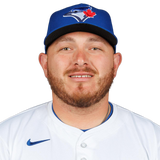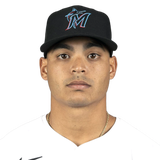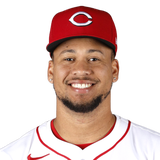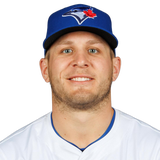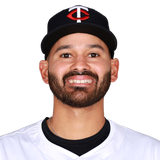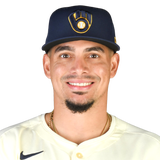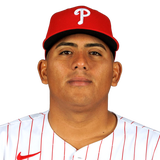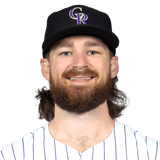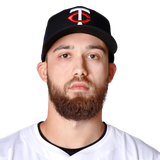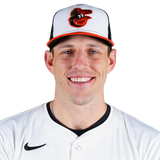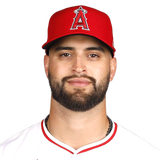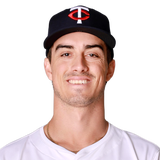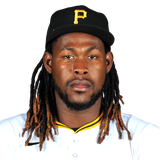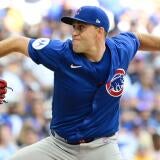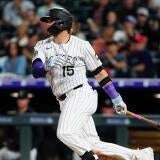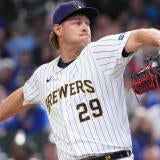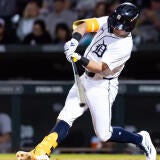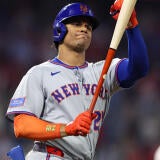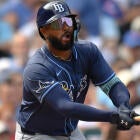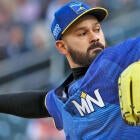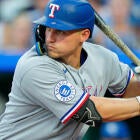2022 Fantasy Baseball Draft Prep: Breakouts 3.0 for Scott White, featuring Alejandro Kirk, Jesus Luzardo
These 18 could take a big leap forward.
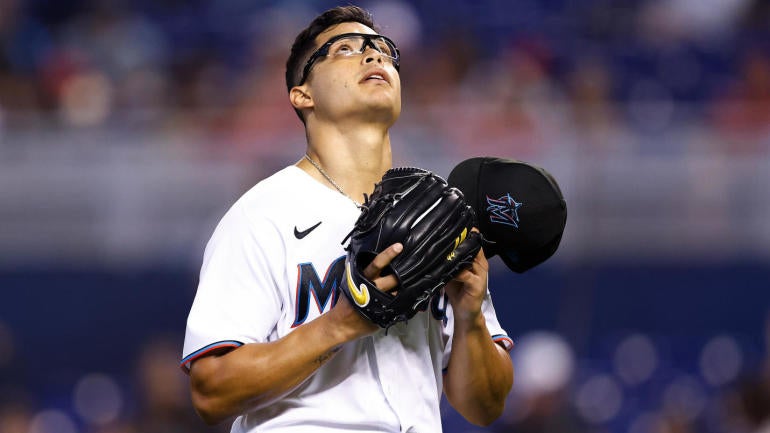
The last time I weighed in on breakouts, we didn't even know when opening day would be. The players were still locked out. Free agency was on hold. It was a different scene altogether.
It's been a short ride from there to here, but even so, Breakouts 2.0 is looking ancient. With opening day barreling down on us, I'd say we're overdue for an update.
To be clear, a "breakout" is a player whose best is yet to come. He may have already established a certain level of value in Fantasy Baseball, but if he takes that next step, he'll distance himself from those drafted around them. You could say he's a sleeper in the broadest sense of the word, but he's a special kind of sleeper who's on the verge of doing something completely new and particularly exciting.
We'll begin with the newest additions to the list before revisiting some of my previous picks.
The Newcomers
Alejandro Kirk, C, Blue Jays
| ||||||||||||
FantasyPros ADP: 271.4
The Rockies' recent acquisition of Randal Grichuk made sense on a number of levels, but it's not as clear what the Blue Jays got out of the deal. I took it as a tacit acknowledgment that Kirk's bat needs to be in the lineup. The portly 23-year-old may lack the defensive chops to be a No. 1 catcher, but his hitting metrics are off the charts, combining the average exit velocity of Bryce Harper with the contact rate of Yuli Gurriel.
The DH spot is where he belongs, making only occasional starts at catcher, and if there's no longer pressure to find Grichuk at-bats (usually by rotating the other outfielders at DH), then it should be available to Kirk more days than not. (No, I don't think Raimel Tapia will simply step into Grichuk's role.)
So what we have here is a catcher-eligible player with the capacity for a .300-plus batting average and 20-plus homers in line for regular at-bats elsewhere. If you can still get Kirk outside the top 10 at the position, you're doing something right.
Jesus Luzardo, SP, Marlins
| ||||||||||||
FantasyPros ADP: 288.6
It's hard to understate the extent to which Jesus Luzardo disappointed last year. Coming off a successful rookie season and still sporting that top-prospect shine, his season derailed early when he fractured his hand playing video games. The most stunning moment, though, came when the always cost-conscious Athletics dealt him for a rental, Starling Marte.
Was he broken? Well, if there was any organization that could put him back together, it was the Marlins, and so far this spring, they appear to have done exactly that. Not only is Luzardo's fastball up an average of 1.5 mph from last season, peaking at 99, but he threw his curveball 48 percent of the time in his latest start. That's more than he's ever thrown it before, which could itself fuel a breakout given that his fastball has held him back in the past.
If the increased velocity means the fastball is now a weapon in its own right, then Luzardo is improving on two fronts. As much as anyone is capable of being this year's Carlos Rodon, he's looking like a worthy candidate.
Mitch Keller, SP, Pirates
| ||||||||||||
FantasyPros ADP: 431.3
Forget the Mitch Keller you've known before. This one is a new creation, having worked with the pitching development program Tread Athletics to remake his delivery. It's longer now, making better use of his wrist and legs, and it has him pumping in 98 mph fastballs on the reg.
His fastball hadn't been the problem in the past, but giving hitters less time to react is liable to make everything play up. Early returns this spring paint a promising picture. He has yet to allow an earned run in 8 2/3 innings, striking out seven and walking one. It's too early to say exactly what the upside is or know what kind of pitcher we're dealing with here, but I'll remind you that Keller was regarded as a top prospect all through his time in the minors. There was hope for him even before the 3 mph velocity jump, in other words, so whatever he's capable of now, I'd like to see it first-hand.
The Holdovers
Corey Seager, SS, Rangers
| ||||||||||||
FantasyPros ADP: 65.8
That MVP season that I predicted for Corey Seager last year is still in there, bubbling just beneath the surface, ready to burst as soon as we let our guard down. The clearest indicator was the pandemic-shortened 2020 season, when he hit .312 with 23 homers and a .999 OPS in 70 games between the regular and postseason. It led to him being drafted as early as Round 2 in some leagues last year.
But then came the slow start in which the batted-ball metrics looked fine but the ball just wasn't dropping in like it should. And then came the broken hand in mid-May, which bled into June and ended up absorbing all of July as well. By August, the big Seager breakout seemed like a lost cause. Many of us had already tuned out of Fantasy Baseball, and those who hadn't were treated to more uninspiring production in that first month back.
But look at his final numbers. Aren't they in the ballpark, maybe just shy a few more home runs? Yup, September is when Seager reached his final form and redeemed a season of fits and starts, batting .385 with nine home runs and 1.174 OPS. The timing could have been better, but in a way, it was perfect because it threw everyone off the scent. I've seen him go as late as 100th in some expert leagues.
The case for a Seager breakout hasn't changed. He has an optimal launch angle for batting average, consistently delivering the sort of line-drive rate that yields a high BABIP. His Statcast page is lit up like a Christmas tree, his xBA and xSLG both ranking in the top 10 percent of the league. As a hitter, he profiles a lot like Freddie Freeman, who's as consistent of a first-rounder (borderline, anyway) as there is. It's the kind of skill set that should translate anywhere, which is why I don't worry so much about Seager leaving the Dodgers for the Rangers. All he needs to blow out his ADP is to be on the field from start to finish.
Frankie Montas, SP, Athletics
| ||||||||||||
FantasyPros ADP: 80.8
It may seem counterintuitive to call Montas a breakout after the year he just had, particularly since he flashed similar potential during an injury-shortened 2019. But it's the manner in which he achieved last year's numbers that makes me think another leap is possible. As late as July 7, 17 starts into the season, he had a 4.63 ERA. That was after putting together a 5.60 ERA in 2020. Whatever mojo his new splitter gave him in 2019 appeared to be long gone.
But about that point is when he ratcheted up his splitter usage, taking it from his fourth most-thrown pitch to his most-thrown pitch. And about that point is when his production soared. Over his final 15 starts, Montas delivered a 2.11 ERA, 1.02 WHIP and 10.8 K/9, his 15.9 percent swinging-strike rate resembling Max Scherzer's. The balance of those first 17 starts and the final 15 gave him numbers that fully justify his ADP, so even if you want to say full-season statistics are more predictive than partial-season stats, what's the downside?
On the other hand, when those partial-season stats are so distinctive and there's an underlying change to accompany them, perhaps they provide the better estimation of what's to come.
Kyle Schwarber, OF, Phillies
| ||||||||||||
FantasyPros ADP: 109.2
The most overlooked part of Schwarber's 2021 stat line is the 399 at-bats, which came in 119 games. The reason he played in only 119 games is because he landed on the IL twice, first for a positive COVID test and later for a hamstring strain that cost him more than a month. It wasn't because of his struggles against left-handers, which have become less pronounced in recent years. It also wasn't because of his defensive shortcomings, which may never be an issue again with the DH spot going universal this year.
I point this out because I want to establish that Schwarber's playing time is secure, unlike in past years, which should put those 2021 numbers in a different light. He hit a career-high .266 with a career best .928 OPS. Project his 32 home runs over the 155 games he played in 2019, and he ends up with 44. Was it a fluke, or are we sleeping on Pete Alonso production, only 60 picks later?
Look, even if Schwarber reverts to what he did in 2019, batting .250 with 38 home runs, it will more than justify his ADP, but there may be an explanation for the improved production. He worked with renowned hitting coach Kevin Long early last year, when both were still with the Nationals, to recapture his old mechanics from college and the minor leagues -- the ones that made him a much-ballyhooed draft pick in 2014. He began crouching lower, aiming to involve his legs in his swing more, and the results speak for themselves. And oh, by the way, he and Long have been reunited in Philadelphia.
Daulton Varsho, C/OF, Diamondbacks
| ||||||||||||
FantasyPros ADP: 114.4
Between the 37 games he played in 2020 and his first 38 in 2021, Varsho was next to useless in Fantasy, batting .168 (32 for 191). So you may have already tuned out by the time he hit .294 (57 for 194) with 10 homers, three steals and an .886 OPS over his final 57 games.
Even just taking his 2021 numbers at face value -- the .246 batting average and .755 OPS -- he looks like someone who'll factor at the catcher position, offering rare speed and a serviceable amount of power, which is why he's being targeted among the top 10. But the full-season numbers understate how good he became when he finally got the hang of playing in the majors.
The stretch I'm referring to -- i.e., his final 57 games -- was more in line with how he performed throughout his minor-league career, batting .302 with an .899 OPS across four seasons, and his modest strikeout rate and all-fields approach would both also suggest he's built for batting average. He's legitimately fast, too, having split his time between catcher and center field last year. In fact, he's in line to be the Diamondbacks regular center fielder this year, which should allow him to play more than most any other catcher, and if he's also running more than the typical catcher, he may well have the most upside of anyone at the position. Who knows? By this time next year, he might be the first catcher drafted.
Pablo Lopez, SP, Marlins
| ||||||||||||
FantasyPros ADP: 129
At this point, it's just health that's holding Lopez back. He missed most of the second half with a strained rotator cuff but looked like as much of an ace as Sandy Alcantara before then. His ERA was lower than Alcantara's, in fact, and his K/9 higher. And while the average length of his starts didn't compare (because whose could?), it's not like the Marlins were afraid for Lopez to take a third turn through the batting order. Half of his 20 starts went six innings or more.
The sample of Lopez doing these sorts of things is larger than just those 20 starts. Rope in his 11 from the pandemic-shortened 2020, and he has a 3.26 ERA, 1.14 WHIP and 9.8 K/9 over about a full season's time. Take out a particularly ugly outing from September 2020 -- a 29-run outburst for the opposing Braves -- and he's down to a 2.90 ERA and 1.11 WHIP.
He's a proven strike-thrower with a wipeout changeup and a knack for limiting home runs. His 3.32 xFIP last year would have ranked eighth among qualifiers, between Charlie Morton and AL Cy Young winner Robbie Ray. All the ingredients are there, then, for Lopez to join the ranks of the elite if he can just navigate a six-month season.
Willy Adames, SS, Brewers
| ||||||||||||
FantasyPros ADP: 135.4
I'm not so sure Adames hasn't broken out already. He isn't being drafted like it, possibly because the average Fantasy league doesn't offer enough shortstop openings to accommodate all the talent. But then again, he's generally taken a couple rounds after Dansby Swanson, whose ceiling at this point is decidedly mid-tier.
Make no mistake, though, Adames was a stud after joining the Brewers, batting .285 with 20 homers and an .886 OPS in the three-quarters of a season he spent with them. The turnaround was just as evident in his strikeout rate, which shrank from an unmanageable 35.9 percent with the Rays to 25.4. Much has been made of Adames' issue with the batter's eye at Tropicana Field, but you may be surprised to learn how well the numbers back the narrative. In all his time with the Rays, which began in 2018, he hit .219 with a .624 OPS at home. He hit .291 with an .858 OPS everywhere else.
Now, where have I seen those numbers before? Oh right, they're almost exactly what he did with the Brewers. Could it be, then, that that's just who he is? We have 1,045 non-Tropicana at-bats to suggest so, in which case Adames may have more in common with Xander Bogaerts than the aforementioned Swanson.
Ranger Suarez, SP/RP, Phillies
| ||||||||||||
FantasyPros ADP: 158
I know what you're thinking. "Scott, you delightful simpleton, how could Suarez possibly improve upon a 1.36 ERA?" And to that, I'd say, "I'm the simpleton? You're the simpleton!" and remind you that breakouts are as much about perception as anything else. Nobody is drafting Suarez like he had a 1.36 ERA, a 2.36 ERA or even a 3.36 ERA, which means that if I think he's capable of a 3.36 ERA, I'm entitled to call him a breakout.
I think he's capable of a 3.36 ERA. The evidence? He just put together a 1.36 ERA. I know it's circular reasoning, but it doesn't take a galaxy brain to see the appeal here. Sure, he spent the first two-thirds of last season in relief, which skews the numbers a bit, but even after joining the rotation in August, he had a 1.51 ERA in 12 starts. His final five were all six innings or more, and his strikeout and walk numbers actually improved with the increased workload.
He was built for this, generating quick outs with a ground-ball rate (59.2 percent) that would have led all qualifiers, and his 2.62 xERA and 2.72 FIP both agree it's a formula for keeping runs off the board. So far, Suarez has been the kind of player people take begrudgingly rather than enthusiastically, but particularly in points leagues, where you can take advantage of his relief pitcher eligibility, he's a high priority for me.
Brendan Rodgers, SS, Rockies
| ||||||||||||
FantasyPros ADP: 177.4
Anyone getting regular at-bats for the Rockies has sleeper appeal, and it goes double for a former high-end prospect just coming into his own. So why isn't there more enthusiasm for Rodgers? Fatigue, I guess. He was drafted third overall in 2015 (going a pick after Alex Bregman, just to give you a sense of how long ago it was) and earned high marks all the way up the minor-league ladder. But it took forever, and then when he finally got the call, there were struggles, amplified by injuries.
An injury (hamstring) delayed the start of his 2021 as well, but when he returned in late May, there were no more struggles. His strikeout rate was a respectable 20.2 percent, meaning he puts the ball in play enough to take advantage of Coors Field's spacious outfield, and yet he produced an even better slash line on the road (.289/.337/.536), which is always a good sign for a Rockies hitter. A respectable batting average is a given as long as he continues to put the bat on the ball, and it might only take him elevating a little more for Rockies fans to forget all about Trevor Story.
Alex Kirilloff, 1B/OF, Twins
| ||||||||||||
FantasyPros ADP: 190.6
Oh, here we go. One of my obsessions last spring is poised to make me look like a chump again, right? Well, think back to how last season played out for the rookie. He got off to a 3-for-26 start, which wasn't unprecedented but was particularly frustrating because of what the Statcast data said he should be doing (i.e., obliterating the ball). He then caught up to the data, hitting four home runs and two doubles over his next four games, before tearing a ligament in his wrist and spending the next few weeks on the IL. He tried playing through the injury for a couple months, with mixed results, before ultimately relenting to season-ending surgery.
Clearly, we didn't get Kirilloff at his best, and this tweet spells it out better than I could:
Alex Kirilloff wasn't the same after the wrist injury.
— Aaron Gleeman (@AaronGleeman) July 21, 2021
Expected AVG:
.317 before
.281 after
Average exit velocity:
96.5 mph before
89.7 mph after
Hard-hit rate:
63% before
40% after
As feared, he just wasn't able to drive the ball as much while playing with a torn ligament.
A healthy Kirilloff hit .348 with a .970 OPS between two minor-league stops in 2018. A wrist-deficient one (yes, last year wasn't the first instance) hit .283 with a .756 OPS at Double-A the following year. Now that the ailment has been addressed, I expect to see more of the former from a player with a sweet swing, a line-drive mindset and a penchant for hard contact.
John Means, SP, Orioles
| ||||||||||||
FantasyPros ADP: 196.4
One of my most hyped preseason picks from a year ago sort of delivered on that promise, making waves early on at least with a no-hit,12-strikeout effort against the Mariners. But he missed a quarter of the season with a shoulder strain and ultimately failed to sustain the strikeout gains from late in 2020, which are what got me so excited in the first place. Factor in his extreme fly-ball rate, which would have been the second-highest among qualifiers, and I ultimately decided Means didn't have it in him to counteract all the damage likely coming his way in the AL East and his home park in particular. I was prepared to fade him.
But then came the news of the Orioles moving back the left field fences at Camden Yards -- and not just a little, but a whopping 30 feet. How does that change things? See for yourself:
These are all 30 ballparks, with the changes made to Camden in yellow. pic.twitter.com/eGpMNm9Q4p
— Andrew Perpetua (@AndrewPerpetua) January 14, 2022
Did I mention they're also raising the height of the fence from seven feet to 12? Yeah ... I don't think it's an exaggeration to say it may now be the toughest place for a right-hander to hit it out, which is bad news for Ryan Mountcastle but good news for the left-handed Means, whose fly-ball tendencies will now be an asset rather than a hindrance. It shouldn't be lost on anyone that his no-hitter last year came at Seattle, with its cavernous outfield. It also shouldn't be lost on anyone that he had a 4.62 ERA at home last year compared to 2.84 on the road. It's like they're making the changes just for him!
Patrick Sandoval, SP, Angels
| ||||||||||||
FantasyPros ADP: 200.6
So it turns out Sandoval's changeup is one of the best swing-and-miss pitches in all the majors, a mid-80s offering that looks just like his fastball out of the hand. In fact, it may have surpassed Luis Castillo's for best in all of baseball. We've known about it for a while, but it wasn't clear if Sandoval would throw enough strikes or eat enough innings for it to matter.
Well, he began to do both last year and, um ... yeah, it mattered. His 15.2 percent swinging-strike rate was bettered by only five pitchers, at least among qualifiers. He even got 30 swings and misses in one game, which is something Max Scherzer can't say, nor Corbin Burnes, nor Jacob deGrom. All those whiffs weren't just empty calories either. From the time Sandoval joined the rotation in mid-May up until his final start (when it became clear he wasn't healthy), he had a 3.12 ERA and 1.06 WHIP. That's 13 starts in all.
The only thing keeping the hype train on the tracks is the lumbar issue that ended his season in August, but there shouldn't be any carryover effect. If he can stay intact and keep his walks under control, Sandoval has legitimate frontline potential.
Joe Ryan, SP, Twins
| ||||||||||||
FantasyPros ADP: 223.8
The case for Ryan isn't complicated. Between 2019 and 2021, across 189 2/3 innings and four minor-league levels, he compiled a 2.47 ERA, 0.82 WHIP and 13.0 K/9, incredible numbers by any standard. So why isn't he mentioned in the same breath as Shane Baz? Because nobody believes it. His success is tied to his fastball, a pitch he throws 65 percent of the time, but it doesn't spin. It doesn't sink. It barely tops 90 mph. What's the deal with that?
The concern is that it's a gimmick and that once hitters get a read on the angle, he'll be reduced to a soft-tossing control specialist. The profile is a little reminiscent of Mike Fiers, who also torched the minor leagues before running into reality in the majors. He had a reasonably successful career regardless, but initial returns were more of a fakeout than a breakout.
Maybe this goes the same way, but what if it doesn't? At this cost? In Ryan's first taste of the majors, things played out much like they did in the minors. Seven one-hit innings here, an 11-strikeout effort there. His fifth and final start was his worst, bringing the ERA over 4.00, but considering the 0.79 WHIP and 10.1 K/9 that accompanied it, my initial takeaway is that his approach should work, at least for now. And as efficient as he is, the volume could be there in a way it won't for someone like Baz.
Jo Adell, OF, Angels
| ||||||||||||
FantasyPros ADP: 227.4
Adell had a miserable first showing in the majors two years ago, striking out more than 40 percent of the time while batting .161. Jarred Kelenic had a miserable first showing in the majors last year, batting .181 in about three times the at-bats Adell got in that first stint. What's curious, though, is that Adell isn't getting nearly the benefit of the doubt Kelenic is, going off the board about 75 picks later on average. Both were consensus top-five prospects the last time they were ranked. Both are projected starters for their clubs going into 2022. So what gives?
There is a notable distinction between the two, and it's this: Adell has already gotten a second chance. So that explains it, right? More of the same? Well, the .246 batting average and .703 OPS he delivered last year were nothing to write home about but also meaningless in a sample of only 140 plate appearances. In the area that mattered most, the improvement was night and day: Adell struck out only 22.9 percent of the time.
I'm not here to discount the possibility of a Kelenic breakout, but it would seem his ADP accounts for it in a way Adell's does not. Now that Adell has assured us he's not a sitting duck against major-leaguers, he seems just as likely to make good on his tools with an extended look. If anything, his minor-league numbers shortchange his speed, which rated in the 98th percentile last year.
Oneil Cruz, SS, Pirates
| ||||||||||||
FantasyPros ADP: 230.8
What stands out most for Cruz is his ceiling. Scouts long predicted he'd leverage his 6-foot-7 frame into massive power, and last year may have been the tipping point. Project his minor-league numbers over 150 games, and he ends up with 37 home runs. He played all of two games in the majors last year and already owns the Pirates' record for hardest-hit ball of the Statcast era. Clearly, he can hack it.
But did I mention he also runs? Yeah, he actually had more stolen bases than home runs in the minors last year, so if we go back to prorating over 150 games, he ends up with 41 steals to go with those 37 homers. We're talking about a power/speed profile the likes of which only two major-leaguers (Fernando Tatis and Ronald Acuna) can replicate, at least in theory.
That's the rub with prospects, right? They actually have to go and do the thing we say they can do, and for Cruz, there are some potential hurdles. The most obvious is his height, which is unconventional to say the least. The taller the hitter, the bigger the strike zone and the slower the swing (generally speaking, anyway). It makes them especially vulnerable to strikeouts, and for a player just breaking in, that's especially troublesome. Aaron Judge, who's also 6-feet-7, managed to succeed in spite of massive strikeout rates early on, but he's a true outlier in terms of how hard he impacts the ball. Can Cruz do the same? Maybe, but it would make him another historical oddity.
There's also the matter of Cruz playing for the Pirates, who are as motivated as any club to keep him in the minors as long as possible, but again, he did get the call last year. He'll begin this year in the minors, getting a little more exposure to Triple-A while also taking some reps in right field, but he doesn't figure to be down for long.
Tony Gonsolin, SP, Dodgers
| ||||||||||||
FantasyPros ADP: 278.2
I liked Gonsolin as a breakout last year, too, but things didn't play out the way I hoped. So what's different about this year? Opportunity, mainly. Max Scherzer is gone. Trevor Bauer is presumed to be as well. With Walker Buehler, Clayton Kershaw and Julio Urias their only remaining fixtures, the Dodgers need Gonsolin in their rotation unlike they ever have before, which should spare him the role roulette that's defined his career so far.
Granted, 27 of his 35 career appearances have come as a starter, but rarely has he been stretched out to handle a conventional workload. I'd argue he never got that chance last year because, in addition to the usual shenanigans, his shoulder wasn't right, landing him on the IL twice. It explains the rise in BB/9 from 1.4 in 2020 to 5.5, but the impact goes beyond that. Only when he returned for good in September was his velocity up to snuff, his slider and splitter back to piling up whiffs. In fact, his 15.1 percent swinging-strike rate in that final month was better than Gerrit Cole had for the entire season.
So far as a major-leaguer, Gonsolin has a 2.85 ERA, 1.09 WHIP and 9.4 K/9. That's over just 142 1/3 innings, but across three seasons. If he can repeat it all in this one, that would be good enough for me.


